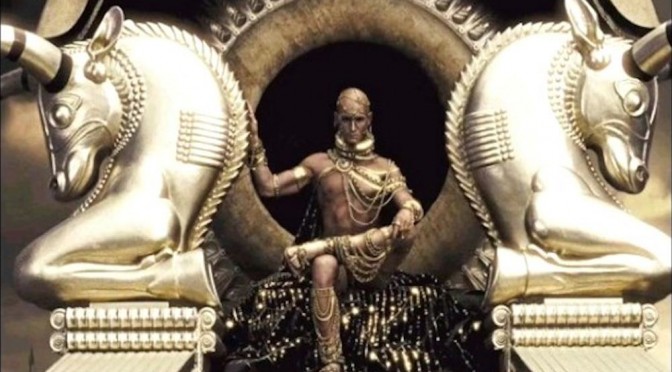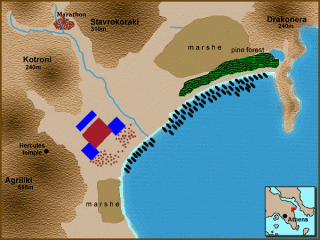The egyptian influence encouraged conflict; both the Persians and Greeks were weakened.
The sack of Sardis
The Egyptians used Miletus to distract Persian attention away from Egypt itself. After Croesus ill fated expedition against Persia in which he was accompanied by Thales, the Persians invaded Lydia and Croesus submitted. In 540 BC Persia occupied all the Ionian settlements in Western Anatolia (now Turkey) except Miletus. Egyptian influences in Athens managed to persuade Athens to support an Ionian revolt against Persian rule. The revolt originated in and was driven from Miletus , perhaps driven by Thales although the “credit” is give to Histiaeus and Arisogras. The centre piece of this revolt was that the Ionians made a particularly brutal attack on Sardis, the Persian local capital. Many thousands of people, perhaps tens of thousands, were burnt to death as the Ionians prevented citizens escaping from the burning city. This was guaranteed to get an instant response from the Persians and that is exactly what happened. It took the Persians six six years to put down the revolt during which time the rebels were continually supported from Athens.
Marathon
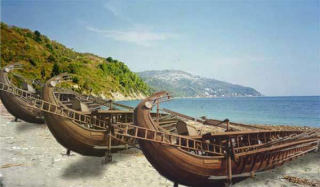 Xerxes prepared to invade Athens. Sparta became involved because they murdered the Persian Ambassador sent to Sparta to seek an alliance. The two major leagues therefore were now committed to a common objective common. The Persians were initially defeated on the beachead at Marathon, by Athenians (490 BC), without the need for Spartan involvement.
Xerxes prepared to invade Athens. Sparta became involved because they murdered the Persian Ambassador sent to Sparta to seek an alliance. The two major leagues therefore were now committed to a common objective common. The Persians were initially defeated on the beachead at Marathon, by Athenians (490 BC), without the need for Spartan involvement.
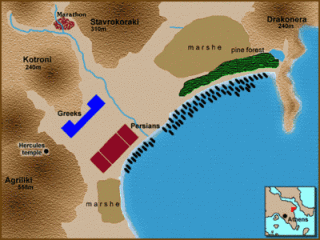
Persian Success
Xerxes Came back with a larger army in 480 BC. Macedonia was defeated and turned into a vassal state just to secure his route. The potential was now laid for an alliance between Macedonia and Athens.
Thermopylae
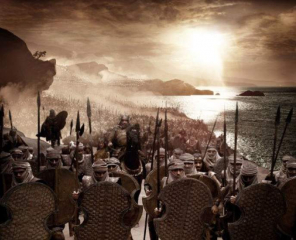 All of the North East of Greece was conquered and the Persians moved south to cross the isthmus of Corinth. On the way they had to move through the pass of Thermopylae, a narrow track along the beach under a high mountain ridge.
All of the North East of Greece was conquered and the Persians moved south to cross the isthmus of Corinth. On the way they had to move through the pass of Thermopylae, a narrow track along the beach under a high mountain ridge.
This is the battle where the legendary 300 Spartans held up an enormous Persian army for seven days. In the end the Persians won and the Spartans, along with about 2000 Thebians and Thespians, who are rarely mentioned, were slaughtered. It was a short lived victory. The Persian navy was caught in a storm and many ships were destroyed. Subsequently the depleated fleet were defeated at Salamis. Deprived of supplies and fresh troops the Persians were defeated at Plataea and left, never to return..
Aspasia
 Egypt was impressed but after the defeat of the Persians now pursued a new agenda. The Greeks were provoked into internal conflict.
Egypt was impressed but after the defeat of the Persians now pursued a new agenda. The Greeks were provoked into internal conflict.
Enter Aspasia, who was said to originate from Miletus. She became the most famous of the Athenian hetaira. The hetaira were courtesans who lived outside of the constraints of antifeminism. There were expected to be true companions for their clients and be able to conversle knowledgably about politics and philosophy. It is even possible that Aspasia invented or at least refining this proffession. It was very convenient. She became the mistress of Pericles the governor of Athens.
The school of Athens
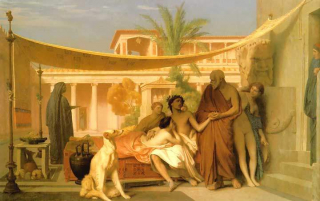 Apsapasia formed a formed a school which discussed current events, literature, philosopy and rhetoric. She composed speeches for Pericles and was accused of denegrating the Greek gods. The ladies who attended her school and indeed may of the men, took her ideas and infiltrated every part of Athenian society. Most people believed that it was Aspasia not Pericles who plotted the war against Sparta.
Apsapasia formed a formed a school which discussed current events, literature, philosopy and rhetoric. She composed speeches for Pericles and was accused of denegrating the Greek gods. The ladies who attended her school and indeed may of the men, took her ideas and infiltrated every part of Athenian society. Most people believed that it was Aspasia not Pericles who plotted the war against Sparta.
More Conflict
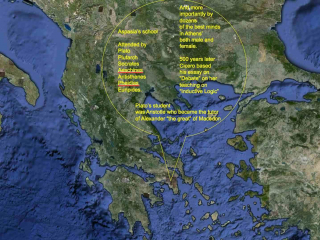 The Athenians now formed the Delian League a development of the Ionian league but now including additional Ionian states from the west and notably Thessaly. The first Peloponnesian war (460-445 BC) between the Peloponnesian league (Sparta) and the Delian league, the Athenians gained an advantage but instead of pressing home their victory opted to send large numbers of their army and their fleet to support the Inaros revolt against the Persians in Egypt. It seems that the war had a disastrous affect of the Athenian economy and Egypt payed the Athenians as mercenaries but more importantly shipped grain to Athens.
The Athenians now formed the Delian League a development of the Ionian league but now including additional Ionian states from the west and notably Thessaly. The first Peloponnesian war (460-445 BC) between the Peloponnesian league (Sparta) and the Delian league, the Athenians gained an advantage but instead of pressing home their victory opted to send large numbers of their army and their fleet to support the Inaros revolt against the Persians in Egypt. It seems that the war had a disastrous affect of the Athenian economy and Egypt payed the Athenians as mercenaries but more importantly shipped grain to Athens.
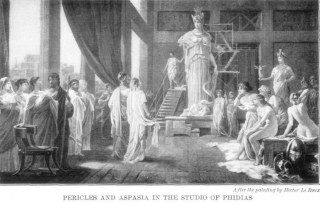 It was be remembered that Pericles was still governor of Athens and was said to be obsessed with Aspasia.
It was be remembered that Pericles was still governor of Athens and was said to be obsessed with Aspasia.
Military Disaster
The Egyptian adventure initially met with success but in 454 the full Persian army entered Egypt and the Athenian army was in the main part destroyed. This turned the advantage back to Sparta and the first Pelopennesian war ended with no significant advantage to either side. Egypt was not impressed by the Athenians eventual capitulation and turned instead to Sparta. In the second Pelopennesian war Sparta set out to develop a navy. Initially they they managed to disrupt the grain supply from the Dardenelles to Athens.
A Weakened Greece
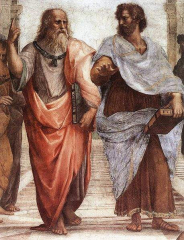 Egypt now formed an alliance with Sparta and supported them in an attack on Cyprus which became temorarily a Spartan possession. Sparta then abandonned Egypt and came to terms with Persia, who funded the building of the Spartan fleet which led to Sparta’s victory in the second Peleponnesian War. Greek mercenaries seeking refuge from an impoverished Greece fought regularly in internal wars of succession in Persia. Both Egypt and Persia played a significant role in encouraging conflict between Sparta and Athens. The motivation of Persia was obvious, they wanted to take the Aegean sea and the Delian league states in Anatolia. Egypt’s objectives were far less obvious. The Egyptians had brought about a situation whereby in the Eastern Mediterranian the dominant races were the Persians and Greeks, although to the west the Carthaginians and Romans were gathering strength.
Egypt now formed an alliance with Sparta and supported them in an attack on Cyprus which became temorarily a Spartan possession. Sparta then abandonned Egypt and came to terms with Persia, who funded the building of the Spartan fleet which led to Sparta’s victory in the second Peleponnesian War. Greek mercenaries seeking refuge from an impoverished Greece fought regularly in internal wars of succession in Persia. Both Egypt and Persia played a significant role in encouraging conflict between Sparta and Athens. The motivation of Persia was obvious, they wanted to take the Aegean sea and the Delian league states in Anatolia. Egypt’s objectives were far less obvious. The Egyptians had brought about a situation whereby in the Eastern Mediterranian the dominant races were the Persians and Greeks, although to the west the Carthaginians and Romans were gathering strength.
The rise of Macedon
The Egyptians now shifted their attention from a weakened Athens and Sparta and quietly Egypt mobilised Macedonia and Epirus to do its bidding. Aspasis’ disciples, including Aristotle, dispersed throughout the Delian League and into Macedonia and Epirus. This picture of Plato and Aristotle is in fact extracted from the larger panorama of the Athenian school, which rsaises the question was the famous Athenian school one and the same as Aspasia’s school? The Greeks never realised how extensive was the Egyptian manipulation. Despite great differences in culture, the Egyptians became a fascination for the Greeks. Leading Greek thinkers visited Egypt regularly . Over time the Greeks adopted Egyptian Gods and particularly Egyptian scholarship which much later permeated throughout the Western World. All through the agency of a courtesan!
